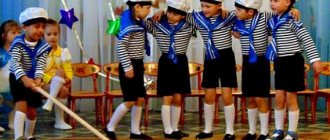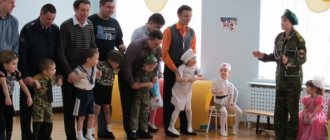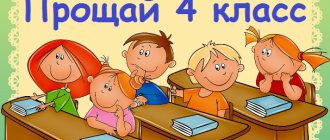The entire Russian education system is undergoing major changes during the transition to new educational standards. And this raises many questions and concerns among specialists working with children. These changes did not spare non-state schools either. New standards of work have also appeared in the work of a school psychologist. But, as practice has shown, this does not mean that the work of a school psychologist changes radically. The main areas of work remain the same.
The transition to new standards allows the school's psychological service to pay more attention to working with parents and their children. There are few forms and methods of such interaction within the school, but they exist, and they are very effective. These are child-parent games.
For some psychologists and other specialists, this line of work may cause distrust: “Why are they all playing when there is too much to do…” (in fact, the number of reports and various papers has increased significantly). Therefore, we will give several arguments for the effectiveness of the game, covering different areas of the psychologist’s work: diagnostic, educational, consulting, etc.
Firstly, the very phrase “child-parent game” does not cause tension among parents. Playing is better than going to parent-teacher conferences. Even dads go with pleasure, they just ask: “Will there be more dads? If they do, I’ll come…” and they come.
Secondly, any family member can come to the game - from mother to great-grandmother or sister. This gives the child a feeling of importance in the family.
Thirdly, while the parents are getting together, you can discuss something important with everyone together or separately.
Fourthly, the class teacher or school psychologist appears before children and parents in a new role, which may be more positive. He does not control the game, but simply participates in it. He also plays with children and can watch them both from the inside and from the outside. And parents see their children in different playing roles, and not just in the role of a child, a student. Very often, parents are pleasantly surprised when they discover a different side to their child: “I didn’t know that my daughter was so artistic” or “I saw how the kids treat my son, it turns out that our class is very noisy and friendly,” etc. .
You can observe how children communicate in an informal setting, and learn a lot of interesting things from the interaction of parents with their children. These materials will be useful in further individual work with the child and parents. And fifthly, the child-parent game is always fun and very lively. Everyone leaves with positive emotions, parents become closer to their children. Often after the game, the whole class with their parents continues the celebration outside the school walls, which is important for uniting the class team.
The game can be timed to coincide with some holiday and make the teacher’s work much easier. Often there is no time to prepare for a school holiday, but here you can play and meet all school requirements without disturbing the planned course of school events. Psychologists come up with games based on the needs of the class and age characteristics.
We bring to your attention the scenarios of the games that we played from first to fourth grade. The script can be modified and used for other ages.
Parents and children are usually notified about the game a week before the event. And it is desirable that the game take place not in the classroom, but in another room. This is also done with psychological intent to change the environment and give students the opportunity to change roles.
The psychologist meets the parents, explains to them their role in the game, then goes after the children. In grades 1–2, parents sit down with their children (children feel more comfortable); in grades 3–4, children and parents become members of different teams. This is thought out by the psychologist in advance. If children of this age sit with their parents, they become very tight, as we observed during games.
You can prepare a presentation and decorate the room, but this is possible if the psychologist has time.
Funny competitions for Mother's Day in kindergarten - ideas
It’s difficult to imagine celebrating Mother’s Day in kindergarten without funny competitions. It is such fun competitions that allow both children and adults to relax, which in turn contributes to the positive atmosphere of the entire event. You need to choose ideas for funny competitions for Mother's Day in kindergarten for the script based on the age of the kids. For example, for a matinee in younger groups, group and active competitions are more suitable. At the same time, older children will be able to participate in games separately or with their mothers.
Daughters and mothers
Despite the fact that only daughters are mentioned in the name of this game, sons and mothers can also participate in it. 4–5 pairs of mothers and children are selected from the audience. The first is blindfolded and asked to take turns finding their child by touch. To complicate the task for the children, you can disguise them a little, for example, by putting headscarves or hairpins on everyone. The mother who accurately finds her baby wins.
Mom's portrait
The children are given an “interview” in advance, in which they answer questions about their mothers. For example, what mom loves most, what she does, what color her eyes are. Then, based on the data received, mothers are asked to guess themselves based on children’s descriptions.
Guess it
The presenter asks the children riddles about mother’s daily housework, responsibilities and functions in relation to the baby. Children must correctly guess all the riddles and promise to help with the housework.
Competitions for children and parents
Competitions for children and parents “Super Mom” for Mother’s Day.
It is proposed to choose two teams for the competition:
Team 1 – mothers, team 2 – their children.
A jury of 3 people: mother, child, class teacher.
1 competition. "Let's get acquainted"
Within 1 minute, the child must talk about the merits of his mother and convince the jury that his mother is the best in the world. The story and acting are judged. (1-5 points)
2 competition. “Guess whose voice it is!”
How many sleepless nights did mothers spend near their children's beds? They jumped out of bed when they heard the voice of their child. You, like no one else, know the voices of your children. It will not be difficult for you to recognize your child by his voice.
(Children take turns pronouncing words; if the mother recognizes her child on the first try, she gets 5 points; if she makes a mistake, she gets fewer points)
3 competition. "Family Chronicle"
Each child takes a question from the box, the leader reads this question. The mother must write the answer on a piece of paper, namely, guess what the child will answer, and gives the sheet to the presenter. Then the child answers the same question orally, after which the mother’s answer is read out. If their answers match, then they receive 5 points, if the matches are not exact, from 1 to 4 points, depending on the answers.
- What is the name of your mother's mother?
- What color skirt (pants) were you wearing when you came to school in 5th grade?
- How many siblings does your mother have?
- What will mom do in her free time?
- What is your mom's dad's name?
- What flowers does mom like most?
- What is your mom's favorite color?
- What color are your mom's eyes?
- What's your mom's favorite dish?
- What animal does mom like?
- What's your mom's favorite movie?
- What's your mom's favorite holiday?
- What's your mom's favorite time of year?
- Your mom's birthday?
4 competition. "Try and guess"
Each team nominates three players. They receive (draw by lot) phrases to be shown together using pantomime (without words): (iron, clock, cat, kangaroo, ball, TV) Time to prepare the pantomime is 1-2 minutes. The rest must guess what exactly was shown.
After the first round the game becomes more difficult. Now you need to show not just a word, but topics - tasks: (a dog is lost, find out how, get to the station, play on the computer, watch TV, solve a problem, meet guests)
For the guessed figure or topic of the task - 5 points.
The essence of the task is that the players, without the help of words, must explain to everyone present what they want. The team that understands the other first wins. Not only the ingenuity of the team is assessed, but also the artistry of the players who stage the task assigned to them.
5 competition. “Come on, decipher it”
For the mom team
: You are a team of speleologists (cave explorers). As a result of a collapse, you may find yourself walled up in a cave, so communication with your comrades will be carried out only by knocking. Come up with your own “language” with which you can communicate without words.”
For a team of children
: “You are a team of intelligence officers who will have to work in a foreign country. Invent a code with which you can send written messages to each other. This cipher, firstly. Shouldn't be too easy to decipher. For example, a self-respecting intelligence officer will never use such a primitive code as 1=A, 2=B, 3=C, 4=D, etc.”
The game ends with a mini-presentation: each group demonstrates how it will communicate in its own language in a certain situation.
6 competition. "Thoughts at a Distance"
Children must draw a proverb on whatman paper, without a single letter. To do this, you can draw animals, people, any objects, arrows, icons, etc. Looking at the drawing, every mother must guess the proverb. If the proverb is guessed by the mother, 5 points; if not, 5 points for the child.
After all competitions have been completed, the jury sums up the results and announces the winners. Children give gifts to mothers.
- What is the name of your mother's mother?
- What color skirt (pants) were you wearing when you came to school in 5th grade?
- How many siblings does your mother have?
- What will mom do in her free time?
- What is your mom's dad's name?
- What flowers does mom like most?
- What is your mom's favorite color?
- What color are your mom's eyes?
- What's your mom's favorite dish?
- What animal does mom like?
- What's your mom's favorite movie?
- What's your mom's favorite holiday?
- What's your mom's favorite time of year?
- Your mom's birthday?
iron, watch, cat, kangaroo, ball, TV
lost dog, find out how to get to the station,
playing on the computer, watching TV,
problem solving, meeting guests
Children's competitions for Mother's Day in elementary school, options
Funny children's competitions for Mother's Day are also relevant for the holiday in elementary school. Moreover, the age of younger schoolchildren already allows for more active and interesting competitions, including team competitions. For example, you can divide all participants into mother-child pairs or into teams of adults and children. Next, you will find several options for children's competitions for Mother's Day in elementary school, which will make the holiday brighter and more fun.
Cook from birth
This option is perfect for competition between child-mother pairs. All participants are given approximately the same set of simple products with a small “surprise” in the form of products that cannot be combined with others. For example, a lot of fruits and herring or vegetables and ice cream. The task of each pair is to prepare an edible dish from this set. In this case, the child must cook himself according to his mother’s promptings. The most creative couple wins.
Half a word, half a glance...
Again pairs of children and parents participate. The children are given a piece of paper with a word, which they will then have to show to their mothers through facial expressions and gestures. It is better to take the names of songs or films whose themes are suitable for Mother's Day. Participants perform in turns and for a time. The most resourceful couple wins.
Beauty salon for daughter
Mothers and daughters are invited to participate. The task of the first ones is to apply full makeup to the second ones in 5 minutes. In this case, not only speed is assessed, but also the technique of completing the task.
Game scenario for 2nd grade “Five”
Goal for parents: to show the merits of children and positive changes in their development.
Goal for children: To show that parents respect their children's school role.
At the beginning of the game, divide the participants into teams. In our case, the children entered the classroom and sat down where their name was written.
The psychologist welcomes the participants.
Leading. Good afternoon, guys and parents! Today we have gathered to play a game called "Five". At the end of the game, parents will also receive their scores.
Warm-up
The psychologist shows slides showing a coin, a hand, a tram number, a mark, etc. (see Appendix), and asks: “Tell me, guys, what is a five?” After listening to different answers, the psychologist sums it up: an A is a mark.
Discussion
— Parents, tell me, why is an “A” important to you? — Guys, why is an A important for a student?
Conclusion: an “A” evaluates the outcome of your studies.
- But in our life we are not only students, we perform different roles: Daughter, Son, Mother, Father.
Conclusion: It is important to learn how to get A's for different roles.
Reading and discussing a fairy tale
Each group receives to read “The Tale of the “A” and a Kind Heart” by O.V. Khukhlaeva (see additional materials at the end of the article). You need to read the fairy tale together and discuss why the animals were not happy about the Cockerel’s mark and what the main conclusion can be drawn from this fairy tale.
Tasks
Each group receives a task: to role-play situations in which children or adults behave kindly towards each other.
Examples of situations
— Petya, coming home from school, always kisses his mother and asks his father in the evening if he is tired after work.
— Fedya received a “C” and was very upset, because he was afraid of upsetting his mother. But his mother hugged him and said: “I love you just the way you are.” Each group receives a task: to think about what could be more important than a grade. (Possible answers: kind word, praise, gratitude.)
Summarizing
In each team, children and parents must say kind words to each other or continue the phrase: “I want to thank you...” (see presentation).
Game script for 3rd grade “Parents in our lives”
Goal for children: to understand the role of parents, to understand that they not only love, care, protect, give money, but also guide (educate) and serve as an example.
Preparing for the game: invite the children to continue the phrase:
- In my family it’s customary... - My parents often... - My mom / my dad usually... - I’m with my parents often.....
It is important to warn children that their answers will be read out during the game, so answer sheets must be signed. Ask the children to alert you if any of the answers are "secret".
Before starting the game, you need to gather the parents separately from the children and talk with them about the fact that the children are approaching adolescence and that this entails a change in their attitude towards their parents and a change in roles in the family. For discussion, parents are asked the question: “What do you think about changing roles?”
Ideas for Mother's Day competitions for mothers in kindergarten and school
Mother's Day competitions for mothers in kindergarten and elementary school should be included in a separate category. Such parent competitions must certainly be funny and cheerful, in order not only to diversify the holiday scenario, but also to greatly cheer up everyone present. Ideas for such competitions for Mother's Day for mothers in kindergarten or school can even be drawn from similar children's competitions. For example, hold a reading competition or thematic drawings among mothers. And to make such competitions even more fun, you can conduct them at speed or blindfolded. And to encourage the winners and cheer up the losers, you should choose interesting prizes. And you don’t have to spend money on expensive souvenirs. Together with your children, you can come up with and make great memorable gifts with your own hands that all participants will surely enjoy. Next, you will find several interesting options for competitions and games for mothers, which can be used for holidays in kindergartens and schools.
Real music lovers
Participating mothers are divided into two teams. The task of each team is to remember and, importantly, sing a popular children's song. It will be enough to reproduce just a few lines or a chorus. The opposing team must guess the title, artist or cartoon/film where this song was played. The team that names the most correct answers wins.
Dance assortment for mommy
Mothers are invited to “remember their youth” and dance a little. At the same time, they will have to dance to different styles. For example, you can make a cut of hits from the 80s and 90s, add an excerpt from a waltz or tango, a little freestyle and a couple of children's soundtracks. The most creative and flexible participant wins.
Mom of all trades
Each participant is given a sewing kit: several scraps of fabric, needles and threads, ribbons, lace. The set also includes completely inappropriate materials, for example, a plastic bottle, disposable plates or garbage bags. The task of every mother is to use this set to make a carnival costume for her child for the upcoming New Year's party. The creativity of completed work is assessed.
More formulas
Parents form small teams of approximately 3-4 participants. Each team is given a piece of paper and a marker. At the “start” command, parents remember and write down formulas from school subjects (physics, chemistry, geography, mathematics, geometry, and so on). Parents will be able to feel like graduates taking an exam and try to get out of it by searching for any formulas in their mobile phone, in their memory, or in the tips of their children. The team that can write the most formulas in one minute will be the winner.
Parents to school
In each pair of parents, one will show and the other will guess. So, all parents are called to school, but for different reasons. And the reasons will be indicated in the forfeits that the couples themselves will draw. A pair of participating parents pull out a forfeit, one of the parents reads the reason for the call to school and tries to show it in every possible way, and the second parent must guess the reason. Time is recorded for each pair. It is better to indicate funny and funny reasons for forfeits, for example, “because he talked like a parrot in class,” “because he fell asleep under a microscope,” “because he chewed a bun in class and did not share it with the teacher,” and so on. The couple that shows the reason best and guesses it the fastest will be the winner. However, there may be several winning couples.
Cool parting words
With each generation, graduates have more and more new expressions and funny words - youth slang. It is precisely using these words that parents will each have to give their parting words. Participants take turns speaking for one minute at a time, trying to use as many youth words as possible, for example, Hai, people. Catch the hype. May life be full of surprises. May everything always be okay. I want to be in the top spot. Remember your teachers. I would like to know what success is. And may luck always be a flashback. The participant (parent) who can come up with the most creative parting words for graduates in a minute, using the largest number of interesting words, will be the winner.
Close acquaintance
The leader forms pairs of parents (in a chaotic order). Each couple is given only one minute, during which the parents must get to know each other closely and learn as many facts about each other as possible. As soon as the minute is up, each participant in each pair quickly presents facts from the life of his “partner”, for example, Lyudmila loves coffee; works as an accountant; she has three children; she watches old films; cross stitch; grows palm trees; afraid of spiders and so on. The couple in which the sum of the facts presented about each other is greater will be the winning couple.
Quick table
Students undoubtedly know the multiplication tables. But for parents, over the years, the numbers in their memory sometimes become blurred. So, parents are divided into teams with the same number of participants. At the same distance from each team there is an easel, on which a column of the multiplication table is written at the end (it is better to take the numbers 7, 8, 9). Team members stand behind each other, as the game will be a relay race. At the “start” command, the first participants run and quickly write the answer to the first example, that is, 9x10=, then the participants run back and pass the baton to the next participants, who also very quickly run to their easel and write the answer to the second example, that is 9x9=... And so on. The team that writes the entire column of the multiplication table correctly faster than the rest will be the winner.











